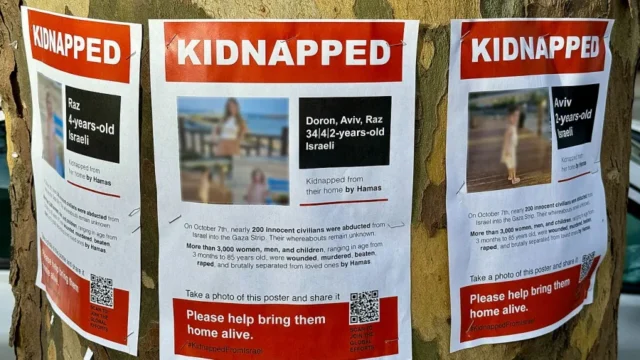The Hamas “hostages-for-terrorists ceasefire” deal brokered by Qatar and driven by the United States reflects Israel’s moral imperative to save its 94 remaining hostages ahead of destroying Hamas.
The price is high.
Global fanfare headlined by CNN’s “Everyone Crying” lead story and Israel’s emotional eruption over Hamas’s grotesquely executed return of the exchange’s first set of hostages – Romi Gonen, 24; Doron Steinbrecher, 31; and Israeli Brit Emily Damari, 28 – after 471 days in captivity, handing them off to the Red Cross with gift bags from the “Hamas government,” vindicates the terror group’s global propaganda campaign. Add to that Hamas’s 33 kidnap victims in the deal’s return with a mere three hostages per week over a grueling six-week first stage, and the psychological torture they and their families must endure adds to Hamas’s negotiating advantage and psychological leverage.
Simultaneously, Jerusalem’s release of hundreds of deadly Palestinian terrorists accrues to Hamas’s psychological war and projection of victory over the “Zionist enemy.”
In short, the current terror-for-hostages exchange isn’t a ceasefire and prisoner exchange in the Western sense of the terms. Rather, this is Islamic warfare, which must frame Israel’s painful debate over the hostage exchange-cessation of fire. This is merely a lull in Israel’s ongoing war to defeat its unrelenting, savage enemy.
As Hamas’s sixth Islamist terror war since 2009, the Palestinian branch of the Muslim Brotherhood sees this moment of exchange as a hudna (a temporary cessation of hostilities), part of Islamic warfare’s strategy to replenish its terror troops, resupply its depots, and relaunch its assaults on Israel. This time, Israel appears to understand Hamas’s Islamic way of war.
Prime Minister Benjamin Netanyahu’s assertion on January 18 that Israel’s military forces would remain in Gaza, deepen its presence on the strategically vital Philadelphi Corridor, and return to vanquish Hamas and Hizbullah, reflect the Jewish state’s political and moral will for victory close to home before eviscerating the terror masters in Tehran. The government’s latest reaffirmations of Netanyahu’s commitment to victory appear to collide with Israel’s still unfinished promises of removing the terrorist threat from Gaza, defeating Hamas as a political and military power, and returning the hostages.
After 15 months of war, these goals have yet to be achieved.
However, in Islamic warfare, holy war or “jihad” is a form of what the Chinese and the Russians have called “hybrid warfare,” combining deception and terror in a long struggle to cause hopelessness and societal implosion among the enemy’s population.
That strategy hasn’t succeeded against Israel. It underscores the importance of Israel’s patience and resilience and defies the shorter timeline for victory that Israel has used to judge its former military successes and reinstated deterrence.
That’s also the context in which to judge the momentary, deal-driven calm in the fighting against the Iran-backed Hamas and Hizbullah jihad.
Professor Joel Hayward’s Islamic Principles of War for the Twenty First Century (2020) and Dr. Harold Rhode’s Modern Islamic Warfare (2017) remind Western readers of the context for understanding Hamas’s war against Israel and the West. They also serve as reference guides for Israel when fighting for its hostages in service of its larger goal to destroy the Hamas death cult and defeat its terror masters in Iran.
Hayward notes that “Mohammed’s oft-repeated statement that war is deceit” is key to understanding Islamic warfare. He notes that “combat is best understood as primarily a battle of wits rather than of wills that should be undertaken as creatively, cunningly, and misleadingly as possible as to keep opponents in a constant state of confusion.”
Netanyahu understands that this terrorist-for-hostage exchange may well not reach the second stage. Hamas’s record speaks for itself. That’s why the Israeli army has remained in the Philadelphi Corridor on the Egyptian Gaza border, established an iron ring of security around the Gaza Strip, and maintains its buffer zone inside Gaza. This is an improved arrangement that Israel could not have made in the May 2024 prospective ceasefire under the Biden administration.
Netanyahu’s recent statements underscore clear-eyed understanding that Israel is fighting jihad’s long war. He noted on January 20, 2025, that “If the negotiations collapse, we will continue the war in new ways, with extreme force, and with the full support of the United States. Hamas is alone in this war, and throughout the ‘deal,’ we will continue to cut off Gaza from every side and when the deal ends, we will continue the war.”
The freshly-minted U.S. administration’s key players have already expressed support for Israel’s fight. Secretary of State Mark Rubio, Defense Secretary Pete Hegseth, and National Security Adviser Mike Waltz called for destroying Hamas in their respective confirmation hearings. The statements are unprecedented in any U.S. administration. It signals that America has Israel’s back in the current war that is far from resolution.
As expected, Hamas’s deception warfare continues unabatedly, now targeting Trump himself. On January 19, 2025, Hamas leader Mousa Abu Marzook, who had been incarcerated in the United States in 1996, convicted of massive terror financing for Hamas, credited Trump for the Gaza ceasefire, saying, “We are prepared for a dialogue with America and achieving understandings on everything.” Hamas’s push for legitimacy challenges Israel to expose Hamas’s strategy and tactics.
The jihadi group doesn’t intend to cease its war with Israel. As Jerusalem Center for Security and Foreign Affairs scholar Khaled Abu Toameh pointed out in a January 19 analysis for the Gatestone Institute, Hamas leader Khalil al-Hayya clarified on January 15 that “Hamas will continue its war on Israel.”
The thousands of Gazans who took to the streets during the January 19 Hamas hostage hand-off chanting, “We will go to Jerusalem, we will sacrifice millions of martyrs,” buttressed al-Hayya’s statements. Lest there remains doubt about Hamas intentions, its Izza din al-Qassam Brigade joined the victory celebrations over the hudna terror-for-hostage exchange, declaring, “We are on the battlefield, and we will remain on the battlefield.”
Hamas Islamic warfare has vindicated Netanyahu’s commitment to win the long war.


